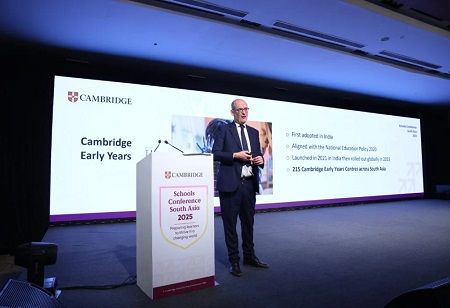Cambridge University Press & Assessment (Cambridge)'s International Education group organized its second annual South Asia Cambridge Schools Conference, gathering 400 educators, school and thought leaders from India, Nepal, Sri Lanka, Bhutan, Bangladesh, and the Maldives. With increasing demand for Cambridge qualifications across the region, the conference reaffirmed Cambridge's dedication to helping schools, teachers and learners navigate the fast-changing education landscape.
The conference coincides with the global need for an additional 44 million teachers by 2030. In response to this, Cambridge has emphasized its own dedication to supporting the region's teachers through new professional development programs and qualifications, upskilling courses, pre-service teacher training, and brief e-learning modules to expand the region's teaching force.
In his welcome address, Rod Smith, Cambridge's Group Managing Director of International Education, commended school leaders in the region for collaborating with Cambridge to develop curricula and resources, and implementing new innovative programs that equip learners to be ready for the world. He stated: "At Cambridge, we are dedicated to preparing learners for a rapidly changing world". To make this possible, we assist teachers with professional growth, we're launching digital exams to enhance testing, and we're implementing AI to complement learning. South Asia is set to become a hub of academic excellence, and we're excited to partner with schools to create new programmes like Cambridge Early Years and Climate Quest that will determine the future of education in the region and worldwide".
Vinay Sharma, Senior Vice President, International Education, South Asia, added: "Our resolve to make international education accessible with the highest quality standards is absolute. We give our schools the autonomy to create a solid foundation of learning, teaching and assessment". Through this conference, we hope to find new means by which we can collaborate to prepare learners not merely to adjust but to thrive in an age characterized by accelerating technological, societal, and economic change.
Cambridge's other main initiatives for students in India are Climate Quest for the development of climate resilience, Cambridge Connect, a programme to address the needs of national high-stakes tests, the March exam series to support local admission requirements, Integrated Learning & Assessment for the building of English as a skill, and Young Pioneers to develop an entrepreneurial spirit.
Panel sessions had distinguished speakers such as Mark Winterbottom, Professor of Education, University of Cambridge, Sarah Hughes, Head of Research, International Education, Cambridge, Sanjay Jain, Head of Google for Education, India, Lindsay Nadin, Director of Digital Products and Services, International Education, Dr Sue Brindley, Faculty of Education, University of Cambridge, Abigail Barnett, Director of Cambridge 3-19 Curriculum, Aynur Ismayilli Karakoc, Senior Impact Evaluator, CUPA, Kevin Ebenezer, Director, University Pathways and Progression, International Education, among others. There are some other principal activities like Climate Quest, Cambridge Connect for country high-stakes examination, March examination series, Integrated Learning & Assessment for establishing English as a skill, Young Pioneers for entrepreneurial skills of the area were also being emphasised.
Sessions focused on applying AI within the classroom, digital high-stakes testing and career paths of the future. Core topics under discussion also featured developing mindfulness within the classroom, transforming college-readiness for developing career paths, and equity for access to excellent education. The academic achievements of various schools were honoured through Cambridge School Recognition Awards that were being handed out within the conference.

